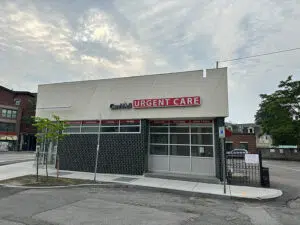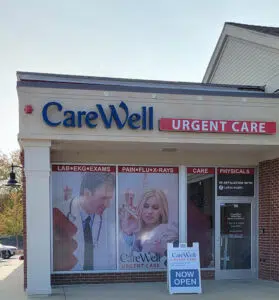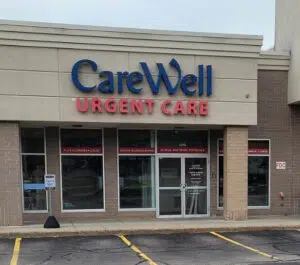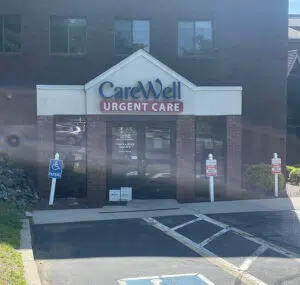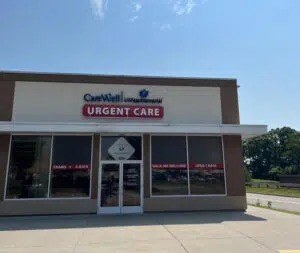Symptoms We Treat
Urgent care is growing in popularity. However, many people still aren’t sure when to go.
Recognizing the symptoms that warrant a visit to CareWell Urgent Care is crucial for timely and effective treatment. Urgent care centers are ideal for addressing a wide range of health issues that require prompt attention but are not severe enough for the emergency room.
If you have any of the symptoms, conditions, or health issues below, CareWell Urgent Care is the right option.
What Does Urgent Care Treat?
Feeling under the weather but not sure if the emergency room is necessary? CareWell Urgent Care can help! Urgent care offers prompt medical attention for various non-life-threatening illnesses and injuries.
What Conditions Does Urgent Care Treat?
Urgent care centers like CareWell Urgent Care can handle a wide range of non-life-threatening illnesses and injuries. This includes:
- Common illnesses: colds, flu, sore throat, ear infections, sinus infections, allergies, and more.
- Minor injuries: cuts, sprains, strains, minor burns, and fractures.
- Other conditions include urinary tract infections, skin infections, and digestive issues.
Remember: If you're experiencing a medical emergency, always call 911 or go to the nearest emergency room. Urgent care is for conditions requiring immediate medical attention but not life-threatening.
Explore the most common urgent care symptoms below.
Eyes, Ears, Nose, and Throat Symptoms
- Eye Discomfort: If you're experiencing symptoms like the sensation of something in your eye or eye redness, it could be a corneal abrasion or conjunctivitis (e.g., pink eye).
- Allergy Symptoms: Seasonal allergies can cause a range of symptoms, including sneezing, congestion, and itchy eyes.
- Cold Symptoms: Symptoms like congestion, runny nose, and sore throat are often due to the common cold.
- Headaches: Migraines can cause intense headaches, nausea, and light sensitivity.
- Sinus Pressure: Sinusitis may present with facial pressure, nasal congestion, and pain.
- Throat Pain: A sore throat with or without white patches may indicate strep throat.
- Infant Illness: Whether it’s a case of sniffles or a high fever, our urgent care center offers compassionate infant care in a comfortable environment for babies and parents.
Chest and Respiratory Symptoms
- Persistent Back Pain: Sudden or chronic back pain can indicate various health issues, including muscle strain or a respiratory condition.
- Breathing Difficulties: Symptoms like shortness of breath or wheezing can be related to asthma or COPD.
- Fatigue and Fever: These could be signs of mononucleosis or pneumonia.
- Cough and Flu Symptoms: A persistent cough, fever, and body aches may be signs of the flu.
Abdominal and Digestive Symptoms
- Stomach and Digestion Issues: Upset stomach, nausea, vomiting, and diarrhea can lead to dehydration and should be addressed promptly.
- Digestive Discomfort: Symptoms like heartburn, indigestion, or abdominal pain can be signs of various digestive issues.
Symptoms in Legs and Lower Extremities
- Wounds and Injuries: Children are often the most susceptible to puncture wounds, sprains, strains, and rashes on their legs that may require professional care to prevent complications. We have staff standing by to assist with any pediatric urgent care needs. We can also provide care for ingrown toenails.
- Joint Pain: Sudden or severe joint pain could indicate gout or other inflammatory conditions.
Arm-Related Symptoms
- Allergic Reactions: Swelling, redness, or itching after contact with an allergen can be signs of an allergic reaction.
- Non-Life-Threatening Injuries: Symptoms like pain, inflammation (swelling), or deformity at an injury site could indicate fractures or dislocations.
Groin Area Symptoms
- Urinary Issues: Painful urination or urgency could be symptoms of a urinary tract infection (UTI).
- Infections: Itching, rash, discharge, or discomfort in the groin area may be signs of yeast infections or sexually transmitted infections (STIs).
Skin Symptoms
- Rashes and Allergic Reactions: Unexplained rashes, persistent itching, or skin infections should be evaluated.
- Wound Care: Open wounds, cuts, or infections need medical attention to heal correctly and prevent infection.
- Insect Bites & Stings: Whether you have an allergy to insect stings or a child is in pain from an insect bite, we can help to reduce the suffering and ensure a quicker and less painful recovery.
- Minor Burns: Burns that impact the outer layer and part of the lower layer of skin may require a trip to urgent care for minor burns.
Minor Injuries
- Broken Bones: A bone fracture is a common injury that needs to be addressed quickly. Our facility is equipped with X-ray imaging to diagnose and determine the severity of your injury. If you think you may have a fracture, it's best to visit urgent care for broken bones right away. We recommend you call ahead to ensure we have Xray staffed on site.
- Cuts, Bruises, and Scrapes: Treatment for cuts and scrapes may be necessary depending on how deep the laceration is or if you can't get it to stop bleeding. Bruises usually resolve on their own, but if the pain caused by a bruise worsens, it could need medical attention.
Urgent Care Treatments
CareWell Urgent Care offers effective treatments for a wide range of common illnesses and injuries. Our experienced medical team is equipped to diagnose and treat your condition promptly.
From minor cuts and sprains to respiratory infections and digestive issues, we provide comprehensive care. We understand that unexpected health concerns can arise, and we're here to help you feel better.
While we handle many conditions, severe or life-threatening emergencies require immediate attention in a hospital emergency room.
Visit CareWell Urgent Care Today
If you recognize any of the urgent care symptoms listed above, walk into your nearest CareWell Urgent Care or save your spot in line to get the help you need. Each symptom can indicate various conditions we can diagnose, treat, or manage accordingly.
CareWell Urgent Care is your partner in health, providing urgent care treatment for a wide array of symptoms that need prompt attention. We focus on getting you back to feeling your best as quickly as possible with compassionate, comprehensive care for non-life-threatening conditions.


